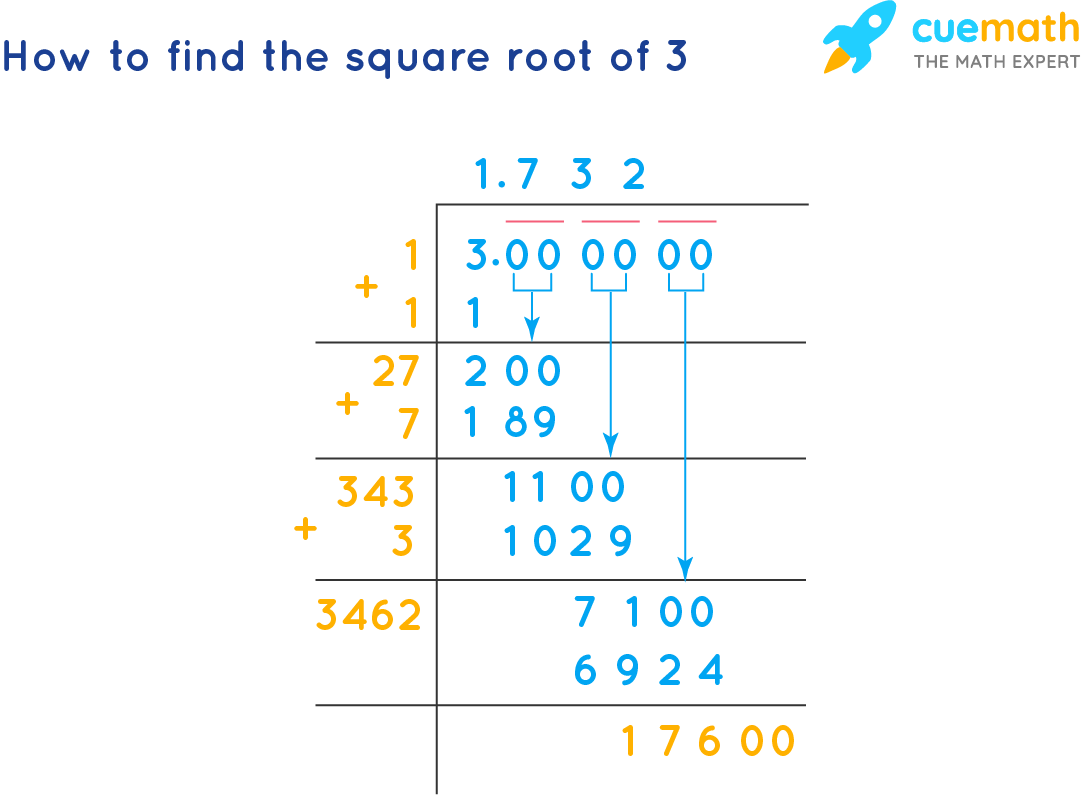Square Root of 3
The square root of 3 is expressed as √3 in the radical form and as (3)½ or (3)0.5 in the exponent form. The square root of 3 rounded up to 7 decimal places is 1.7320508. It is the positive solution of the equation x2 = 3.
- Square Root of 3: 1.7320508075688772
- Square Root of 3 in exponential form: (3)½ or (3)0.5
- Square Root of 3 in radical form: √3
| 1. | What is the Square Root of 3? |
| 2. | Is the Square Root of 3 Rational or Irrational? |
| 3. | How to Find the Square Root of 3? |
| 4. | Important Notes |
| 5. | FAQs on Square Root of 3 |
| 6. | Challenging Questions |
What is the Square Root of 3?
The square root of a number is a number which when multiplied by itself, results in the original number. For example, the square root of 25 is 5, as 5 times 5 results in 25. However, you can also have square roots of some numbers that do not result in whole numbers, such as 3. We can express the square root of 3 in different ways
- Decimal form: 1.732.
- Radical form: √3
- Exponent form: 31/2
Is the Square Root of 3 Rational or Irrational?
- The decimal part of the square root 3 is non-terminating. This is the definition of an irrational number.
- Looking at the decimal form of the root 3, we see that it is never-ending -
√3 = 1.732050807……. - Therefore, we can conclude that Square Root of 3 is Irrational
How to Find the Square Root of 3?
Since we concluded that the square root of 3 is non-terminating, we can only use the long-division method to calculate its value.
- Step 1: To begin, we write 3 as 3.000000 and group the 0s after the decimal point in pairs of 2 from left to right as shown below. (for digits to the left of the decimal point, pair them from right to left)
- Step 2: Think of a number which when multiplied with itself, is less than or equal to 3. In this case, that number would be 1.
- Step 3: Dividing by 3 by 1 with quotient set as 1, we get a remainder of 2.
- Step 4: Drag a pair of 0’s down and fill it next to 2 to make the dividend 200.
- Step 5: The divisor which is 1 here is added with itself and written below. Now, we have 2X as the new divisor, and we need to find a value of X that makes the product of 2X × X less than or equal to 200. In this case, 27 is the required value
- Step 6: The number 7 is placed in the quotient after a decimal place. The new divisor for the next division will be 2X + X, which is 34 in this case.
Proceeding in the same manner and repeating from step 4, we can calculate the rest of the decimals.

Explore Square Roots using illustrations and interactive examples
Important Notes
- The real roots of √3 are ± 1.732.
- The Square root of a perfect square is always a rational whole number and that of other numbers is always irrational. For example, √16 = 4, whereas √17 = 4.1231…
Challenging Questions
- Find the value of √√3.
- What is the side length of a square with an area of 10? (Hint: Use long division method)
- Determine the square root of 33.
Solved Examples
-
Example 1
John was wondering whether the value of -√3 is the same as √-3. What do you think?
Solution
Negative square roots cannot be real numbers.
-√3 is a real number.
But √-3 is an imaginary number.
Hence, they are not the same, and -√3 is not the same as √-3. -
Example 2
Micheal is travelling down the highway at an average speed of 50√3 km/hr for exactly 1 hour. How much distance does he cover?
Solution
We need to use the formula Distance = Speed * Time
Speed = 50√3 = 86.603 km/hr
Time = 1 hr
Using the formula, Distance = 86.603 * 1 = 86.603Therefore, Micheal covers a distance of 86.603 km
-
Example: If the area of a circle is 3π in2. Find the radius of the circle.
Solution:
Let 'r' be the radius of the circle.
⇒ Area of the circle = πr2 = 3π in2
⇒ r = ±√3 in
Since radius can't be negative,
⇒ r = √3
The square root of 3 is 1.732.
⇒ r = 1.732 in

FAQs on the Square Root of 3
What is the Value of the Square Root of 3?
The square root of 3 is 1.73205.
Why is the Square Root of 3 an Irrational Number?
The number 3 is prime. This implies that the number 3 is pairless and is not in the power of 2. Therefore, the square root of 3 is irrational.
If the Square Root of 3 is 1.732. Find the Value of the Square Root of 0.03.
Let us represent √0.03 in p/q form i.e. √(3/100) = 0.03/10 = 0.173. Hence, the value of √0.03 = 0.173
Evaluate 14 plus 16 square root 3
The given expression is 14 + 16 √3. We know that the square root of 3 is 1.732. Therefore, 14 + 16 √3 = 14 + 16 × 1.732 = 14 + 27.713 = 41.713
Is the number 3 a Perfect Square?
The number 3 is prime. This implies that the square root of 3 cannot be expressed as a product of two equal integers. Therefore, the number 3 is not a perfect square.
What is the Square Root of 3 in Simplest Radical Form?
The number 3 is a prime number. This implies that the number 3 is pairless and is not in the power of 2. Therefore, the radical form of square root of 3 cannot be simplified further.
visual curriculum
